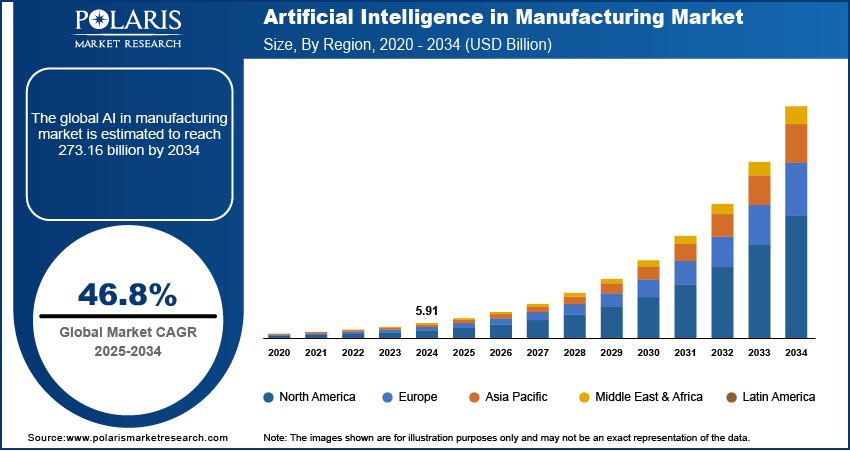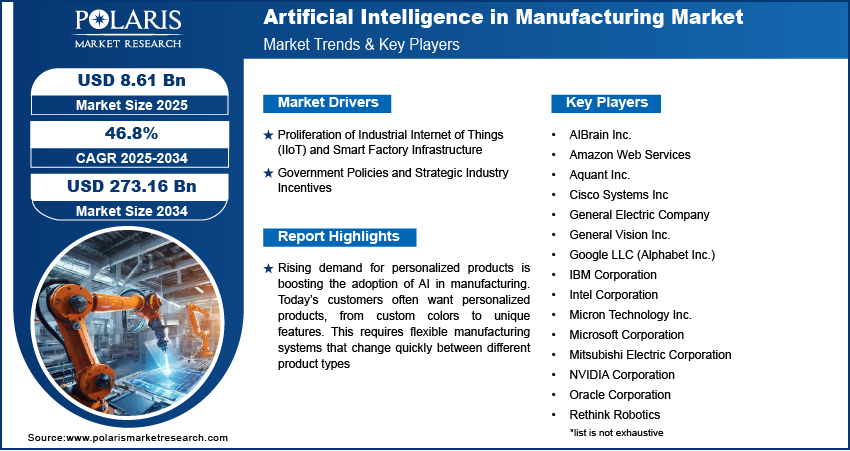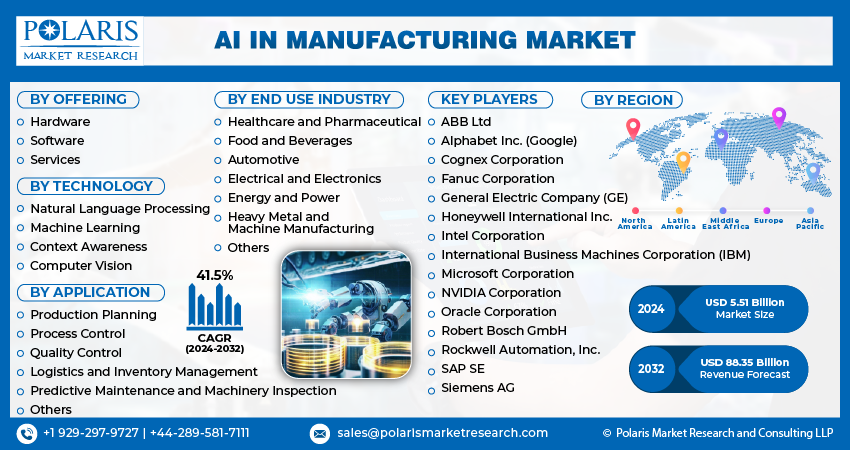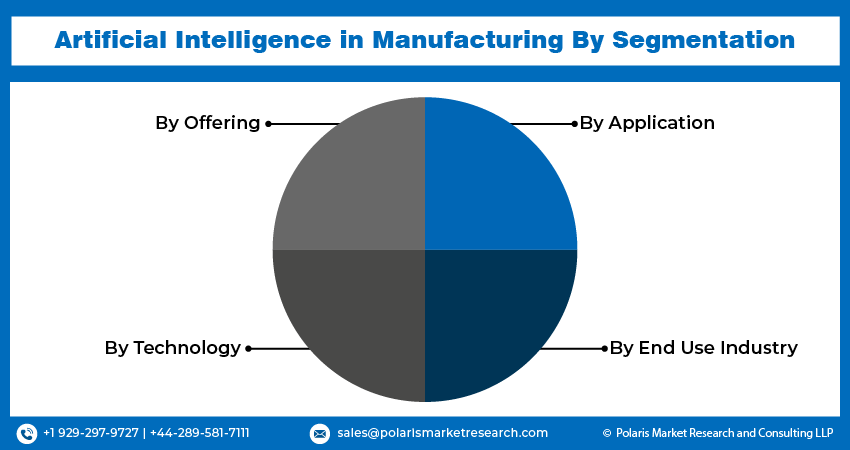
Artificial Intelligence in Manufacturing Market Size, Share, Trends, Industry Analysis Report
By Component (Hardware, Software), By Technology, By Application, By End Use, By Region – Market Forecast, 2025–2034
- Published Date:Aug-2025
- Pages: 129
- Format: PDF
- Report ID: PM3996
- Base Year: 2024
- Historical Data: 2020-2023
Overview
The global artificial intelligence in manufacturing market size was valued at USD 5.91 billion in 2024, growing at a CAGR of 46.8% from 2025 to 2034. The market growth is driven by proliferation of industrial internet of things and smart factory infrastructure, and government policies and strategic industry incentives.
Key Insights
- In 2024, the hardware segment held the largest market share, driven by the rising demand for AI-powered machinery, sensors, processors, and edge computing devices across manufacturing facilities.
- The production planning segment is anticipated to grow significantly as manufacturers increasingly focus on agility and responsiveness to rapidly changing market dynamics.
- North America led the market in 2024, supported by its advanced industrial infrastructure, strong research and development capabilities, and substantial investment in digital transformation initiatives.
- The U.S. market is expected to experience robust growth over the forecast period, fueled by early adoption of emerging technologies, a well-established industrial base, and a strategic focus on automation.
- The Asia Pacific region is projected to register considerable growth during the forecast period, driven by accelerating industrialization, rising labor costs, and proactive government support for smart manufacturing initiatives.
Industry Dynamics
- Proliferation of industrial internet of things (IIoT) and smart factory infrastructure drives the demand.
- Government policies and strategic industry incentives is fueling the industry growth.
- Rising demand for personalized products is boosting the adoption of AI in manufacturing.
- High initial investment costs and integration complexities are restraining the adoption of AI in manufacturing.
Market Statistics
- 2024 Market Size: USD 5.91 billion
- 2034 Projected Market Size: USD 273.16 billion
- CAGR (2025–2034): 46.8%
- North America: Largest market in 2024
AI in manufacturing refers to the use of artificial intelligence technologies such as machine learning, computer vision, and robotics to optimize production processes, improve quality control, and reduce downtime. It enables predictive maintenance, real-time monitoring, and automated decision-making across supply chains and factory operations. AI helps manufacturers increase efficiency, lower costs, and respond more quickly to market demands by analyzing large volumes of data.
Maintaining high product quality is key for customer satisfaction and business success. AI helps manufacturers find defects or errors in products by using smart cameras and software that analyze every item on the production line. These systems spot tiny flaws that humans might miss and can do so faster and more consistently. Over time, AI may also learn which issues happen most often and help fix the root causes. This reduces waste and returns and helps build a strong brand reputation. The ability to ensure better quality drives more companies to invest in AI, thereby driving adoption.

Rising demand for personalized products is boosting the adoption of AI in manufacturing. Today’s customers often want personalized products, from custom colors to unique features. This requires flexible manufacturing systems that change quickly between different product types. AI supports this by helping machines adapt in real-time, making smart decisions based on what’s needed. It further enables technologies like 3D printing and digital twins, which are important for smart factories. Manufacturers stay competitive in a world that demands more customization, faster delivery, and better service by using AI, thereby driving the growth.
Drivers & Opportunities
Proliferation of Industrial Internet of Things (IIoT) and Smart Factory Infrastructure: The expansion of the Industrial Internet of Things (IIoT) has created an ecosystem where vast amounts of data are generated by interconnected devices across factory floors. AI serves as the analytical backbone of this ecosystem, converting raw data into actionable insights for predictive operations, resource optimization, and supply chain responsiveness. Additionally, the smart factory initiatives is rising, particularly under Industry 4.0 frameworks, which is pushing manufacturers to invest in AI-driven systems that interpret sensor data in real time. In May 2024, Schneider Electric opened its 36th smart factory in Europe, which is also the 22nd smart factory in the region operated by Schneider. The synergy between IIoT and AI is driving its adoption by reshaping how manufacturers monitor, control, and optimize production environments.
Government Policies and Strategic Industry Incentives: Governments and industry bodies worldwide are actively promoting AI integration through strategic policy initiatives, funding programs, and innovation hubs. National strategies such as Germany’s “Industries 4.0,” China’s “Made in China 2025,” and India’s “Digital India” emphasize smart manufacturing, with AI as a core enabler. These initiatives are supported by tax incentives, public-private partnerships, and R&D subsidies to encourage digital innovation among manufacturers. This policy-level support is crucial in lowering the barriers to entry for AI technologies, especially for small and medium-sized enterprises (SMEs), thereby driving the growth.

Segmental Insights
Component Analysis
The segmentation, based on component, includes hardware, software, services. In 2024, the hardware segment dominated with the largest share due to the growing need for AI-enabled machines, sensors, processors, and edge devices on factory floors. There is a strong demand for high-performance computing units capable of handling large datasets in real time as manufacturers increasingly implement AI-driven systems. Investments in robotics, industrial automation, and AI-integrated machinery have further accelerated hardware deployment. Additionally, lower hardware costs and advancements in AI chips specifically designed for industrial tasks have further driven adoption, thereby fueling the segment growth.
Technology Analysis
The segmentation, based on technology, includes machine learning (ML), computer vision, context awareness, natural language processing. The computer vision segment accounted for significant growth due to rising demand for automated visual inspection and real-time monitoring in manufacturing processes. Industries such as electronics, automotive, and pharmaceuticals are leveraging computer vision to detect product defects, ensure assembly accuracy, and improve safety. This technology reduces reliance on manual inspection, improves consistency, and speeds up quality control. Advancements in image recognition algorithms and deep learning have made computer vision more precise and affordable. The push for higher production standards and faster error detection drive investment in this segment across both small and large-scale manufacturing setup.
Application Analysis
The segmentation, based on application, includes material movement, predictive maintenance & machinery inspection, production planning, field services, quality control & reclamation, and others. The production planning segment is expected to experience significant growth as manufacturers strive to become more agile and responsive to market changes. AI improves production planning by forecasting demand, optimizing scheduling, and managing resources more effectively. Companies are turning to AI for real-time decision-making and predictive analytics with supply chain disruptions and increasing demand variability. AI-driven planning tools help reduce waste, avoid production delays, and improve overall efficiency, thereby boosting the segment growth.
End Use Analysis
The segmentation, based on end use, includes semiconductor & electronics, energy & power, medical devices, automobile, heavy metal & machine manufacturing, and others. The medical devices segment dominated with largest share due to strict quality standards, the need for precision, and rising global healthcare demand. AI is largely used to ensure regulatory compliance, track production in real time, and maintain tight control over manufacturing processes. The sector requires high levels of accuracy and documentation, making it ideal for AI adoption. Additionally, the growing complexity of medical technologies and increased global demand for personalized healthcare devices are driving the need for AI-powered design, prototyping, and production systems, positively impacting the segment growth.

Regional Analysis
North America Artificial Intelligence in Manufacturing Market Trends
The market in North America dominated with the largest share in 2024, driven by its advanced industrial infrastructure, strong R&D ecosystem, and high investment in digital transformation. Major manufacturing sectors such as automotive, aerospace, and electronics are increasingly implementing AI to improve operational efficiency and product innovation. The presence of top AI technology providers and growing partnerships between tech firms and industrial players are fueling rapid integration. Additionally, the region’s focus on smart factories and Industry 4.0 initiatives, backed by government funding and supportive regulations, is accelerating AI deployment across medium to large-scale manufacturing enterprises, thereby driving the growth.
U.S. Artificial Intelligence in Manufacturing Market Insights
The industry in the U.S. is expected to witness significant growth during the forecast period, due to its early investment in emerging technologies, robust industrial base, and focus on automation. American manufacturers are leveraging AI for predictive maintenance, supply chain optimization, and smart robotics to stay globally competitive. Government initiatives such as the National AI Initiative Act and support for reshoring industrial capabilities have further spurred investment. In addition, strong collaboration between universities, startups, and large corporations fosters innovation and practical AI applications in production environments. The push toward digital manufacturing and resilient supply chains fuels the growth.
Asia Pacific Artificial Intelligence in Manufacturing Market Analysis
The Asia Pacific industry is projected to witness substantial growth during the forecast period due to increasing industrialization, rising labor costs, and strong government backing for smart manufacturing. Countries like Japan, South Korea, and India are investing in AI to modernize factories, improve productivity, and reduce dependency on manual labor. Regional governments are launching national programs to support digital infrastructure and AI training, especially in SMEs. The region’s large-scale manufacturing output and expanding electronics and automotive sectors create a high demand for AI-driven automation. Adoption is growing steadily across diverse manufacturing industries as AI becomes more accessible and affordable, thereby driving the growth.
China Artificial Intelligence in Manufacturing Market Insight
The China industry is projected to witness substantial growth during the forecast period driven by strong government policies under the "Made in China 2025" initiative. The country is heavily investing in AI to upgrade traditional manufacturing, improve productivity, and reduce reliance on foreign technology. China is rapidly deploying AI in areas such as robotics, quality inspection, and production planning with vast manufacturing capabilities and a large tech talent pool. State-backed funding, large-scale pilot projects, and widespread use of industrial IoT devices are fueling AI integration. China's strategic goal in smart manufacturing globally continues to drive aggressive growth in this market.
Europe Artificial Intelligence in Manufacturing Market Insights
The industry in Europe is expected to experience significant growth in the future, driven by strong policy frameworks, sustainability regulations, and the push toward green and digital transformation. The European Union's focus on Industry 5.0, which emphasizes human-centric, resilient, and sustainable manufacturing, is encouraging the integration of AI into production systems. AI is being used to improve energy efficiency, reduce emissions, and support the transition to circular manufacturing models. Additionally, EU funding initiatives like Horizon Europe and national-level digitization programs are empowering manufacturers to adopt AI technologies. The region’s strict quality and compliance standards further create a strong use case for AI-based quality control and predictive systems, thereby fueling the growth.
Germany Artificial Intelligence in Manufacturing Market Outlook
The market in Germany is expected to experience significant growth due to its leadership in the Industry 4.0 movement and a deeply rooted tradition in precision engineering. The country’s automated industrial base in sectors like automotive, machinery, and electronics, is rapidly integrating AI to optimize production planning, quality assurance, and supply chain logistics. Government initiatives such as “Plattform Industrie 4.0” and strong collaborations between research institutions and manufacturing firms are accelerating AI deployment. Additionally, Germany’s export-driven economy is pushing manufacturers to adopt AI to maintain global competitiveness through innovation, efficiency, and product customization, thereby boosting the growth.

Key Players and Competitive Analysis
The AI in Manufacturing market is highly competitive, featuring a mix of global technology leaders, automation specialists, and innovative AI newcomers. Established industrial giants like General Electric, Siemens, Mitsubishi Electric, and Rockwell Automation deliver robust AI-integrated manufacturing solutions, from predictive maintenance to smart automation. Cloud and AI platform leaders including Amazon Web Services (AWS), Microsoft, Google, IBM, Oracle, and SAP enable manufacturers to deploy scalable AI-driven analytics, supply chain visibility, and IoT-enabled processes. Hardware and semiconductor companies such as Intel, NVIDIA, and Micron Technology supply computing power and edge intelligence critical for machine learning and real-time automation. Additional players like Cisco Systems and AIBrain contribute with AI-driven connectivity and operational optimization. Specialized firms such as Rethink Robotics, General Vision, and Sight Machine focus on niche applications like robotic vision, visual inspection, and shop-floor analytics. Together, these players combine broad capabilities, deep domain expertise, and emerging technologies to shape the future of AI-powered manufacturing.
Key Players
- AIBrain Inc.
- Amazon Web Services
- Aquant Inc.
- Cisco Systems Inc
- General Electric Company
- General Vision Inc.
- Google LLC (Alphabet Inc.)
- IBM Corporation
- Intel Corporation
- Micron Technology Inc.
- Microsoft Corporation
- Mitsubishi Electric Corporation
- NVIDIA Corporation
- Oracle Corporation
- Rethink Robotics
- Rockwell Automation Inc
- SAP SE
- Siemens AG
- Sight Machine
- Spark Cognition Inc.
Artificial Intelligence in Manufacturing Industry Developments
In January 2025 Accenture launched its AI Refinery for Industry, introducing 12 industry-specific AI agent solutions to accelerate enterprise adoption of agentic AI, enhance workforce capabilities, and streamline business operations across sectors using NVIDIA’s advanced AI technology.
In June 2025 Amazon launched its new AI foundation model, DeepFleet, to enhance robotic fleet efficiency and deployed its one millionth robot, improving delivery speed, reducing operational costs, and reinforcing its leadership in intelligent warehouse automation.
Artificial Intelligence in Manufacturing Market Segmentation
By Component Outlook (Revenue, USD Billion, 2020–2034)
- Hardware
- Software
- Services
By Technology Outlook (Revenue, USD Billion, 2020–2034)
- Machine Learning (ML)
- Computer Vision
- Context Awareness
- Natural Language Processing
By Application Outlook (Revenue, USD Billion, 2020–2034)
- Material Movement
- Predictive Maintenance & Machinery Inspection
- Production Planning
- Field Services
- Quality Control & Reclamation
- Others
By End Use Outlook (Revenue, USD Billion, 2020–2034)
- Semiconductor & Electronics
- Energy & Power
- Medical devices
- Automobile
- Heavy Metal & Machine Manufacturing
- Others
By Regional Outlook (Revenue, USD Billion, 2020–2034)
- North America
- U.S.
- Canada
- Mexico
- Europe
- Germany
- France
- UK
- Italy
- Spain
- Netherlands
- Russia
- Rest of Europe
- Asia Pacific
- China
- Japan
- India
- Malaysia
- South Korea
- Indonesia
- Australia
- Vietnam
- Rest of Asia Pacific
- Middle East & Africa
- Saudi Arabia
- UAE
- Israel
- South Africa
- Rest of Middle East & Africa
- Latin America
- Brazil
- Argentina
- Rest of Latin America
Artificial Intelligence in Manufacturing Market Report Scope
|
Report Attributes |
Details |
|
Market Size in 2024 |
USD 5.91 Billion |
|
Market Size in 2025 |
USD 8.61 Billion |
|
Revenue Forecast by 2034 |
USD 273.16 Billion |
|
CAGR |
46.8% from 2025 to 2034 |
|
Base Year |
2024 |
|
Historical Data |
2020–2023 |
|
Forecast Period |
2025–2034 |
|
Quantitative Units |
Revenue in USD Billion and CAGR from 2025 to 2034 |
|
Report Coverage |
Revenue Forecast, Competitive Landscape, Growth Factors, and Industry Trends |
|
Segments Covered |
|
|
Regional Scope |
|
|
Competitive Landscape |
|
|
Report Format |
|
|
Customization |
Report customization as per your requirements with respect to countries, regions, and segmentation. |
FAQ's
The global market size was valued at USD 5.91 billion in 2024 and is projected to grow to USD 273.16 billion by 2034.
The global market is projected to register a CAGR of 46.8% during the forecast period.
Asia Pacific dominated the market share in 2024.
A few of the key players in the market are Microsoft Corporation; Mitsubishi Electric Corporation; NVIDIA Corporation; Oracle Corporation; Rethink Robotics; Rockwell Automation Inc; SAP SE; Siemens AG; Sight Machine; Spark Cognition Inc.
The hardware segment dominated the market share in 2024.
The production planning segment is expected to witness the significant growth during the forecast period.
